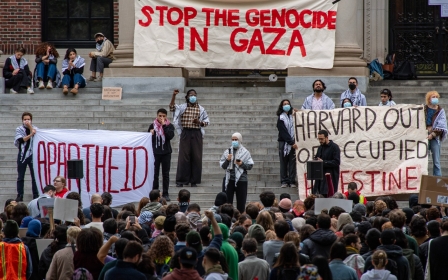Harvard Law School body labels Israel's war on Gaza a 'genocide'

Harvard Law School’s student government has labelled Israel’s war on Gaza a genocide, in an open letter demanding the US university divest from Israel.
“Harvard Law School Student Government formally calls upon HMC to divest completely from weapons manufacturers, firms, academic programs, corporations, and all other institutions that aid the ongoing illegal occupation of Palestine and the genocide of Palestinians,” the student body said in an open letter posted on the university website.
The resolution was passed in an anonymous vote of 12 to four, with three abstentions, but has generated some blowback. Two members of the student body, Regina De Nigris and Cameron Adkins, said they strongly disagreed with the decision in a resignation letter, according to The Harvard Crimson.
The open letter makes a historical case for Harvard Management Company’s $50bn endowment to divest from Israel.
It noted that in 1986 Harvard conducted a “selective divestment” of companies selling products to apartheid-era South Africa’s military. In 1990, the university divested from tobacco stocks, citing its “desire not be associated with companies engaged in significant sales of products that create a substantial and unjustified risk of harm".
Stay informed with MEE's newsletters
Sign up to get the latest alerts, insights and analysis, starting with Turkey Unpacked
The letter builds on previous calls for Harvard to divest from Israel, after the Harvard Crimson reported in 2020 that the university had almost $200m of investments in companies on a UN list that were tied to Israeli settlements, considered illegal under international law, in Palestine.
In 2019, the Harvard endowment fund’s committee on shareholder responsibility released an “anti-genocide policy” that called for greater transparency on investments in countries tied to genocide or crimes against humanity.
“Since 1948, Palestinians have faced dispossession and ethnic cleansing, most recently exhibited through Israel's genocidal campaign in Gaza which has killed more than 30,000 Palestinians,” the Harvard Law authors said, citing the United Nations International Court of Justice (ICJ) ruling that said it was “plausible” that Israel’s actions in Gaza amounted to genocide.
The letter builds on previous work by students of Harvard to advocate on behalf of Palestine.
Earlier this year, students submitted a civil rights complaint against the institution claiming that it failed to provide adequate support or protection to students facing harassment due to their Palestinian, Arab, and Muslim identities or supporting Palestine.
But like other institutions, the school has become a fault line for pro-Palestinian and pro-Israeli voices.
In early January, Claudine Gay, Harvard's former president, resigned, following criticism of her testimony at a congressional hearing where she declined to give a “yes” or “no” answer when asked whether calling for the genocide of Jewish people violated Harvard's code of conduct on harassment.
The Law School’s Jewish Law Students Association issued a statement, strongly opposing the resolution.
“As Jewish leaders, we denounce a resolution singling out the only Jewish state — this student government does not represent us nor many of the hundreds we represent,” it wrote, referring to the fact that the letter didn’t condemn Hamas for its 7 October attack on southern Israel that killed around 1,200 people and saw more than 200 hostages taken into Gaza.
Israel launched a ferocious assault on the besieged enclave in return that has killed more than 32,000 people, mainly women and children.
Middle East Eye delivers independent and unrivalled coverage and analysis of the Middle East, North Africa and beyond. To learn more about republishing this content and the associated fees, please fill out this form. More about MEE can be found here.


.jpg.webp?itok=iMZRudwZ)
.jpg.webp?itok=9h5nJ-0m)

